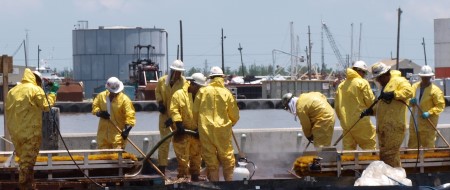Worker Training Program
Our Role in National Response and Recovery Activities

A National Response Framework (NRF) guides the nation on how to respond to all types of disasters and emergencies. If the NRF is activated, the Occupational Safety and Health Administration may ask the NIEHS Worker Training Program (WTP) to provide:
- Training technical assistance, such as instructional staff, curriculum development experts, subject matter experts, and professional staff.
- Safety training specific to the nature and location of the incident and the particular hazards.
- Assistance and support in the development and delivery of site-specific health and safety training through appropriately qualified WTP award recipient instructional staff.
- Assistance such as respirator fit testing and distribution of personal protective equipment.
The U.S. Department of Health and Human Services, which includes the National Institutes of Health and NIEHS, is a signatory to the NRF and the National Disaster Recovery Framework (NDRF). The NDRF aligns with the NRF. While the NRF primarily addresses actions during disaster response, the NDRF provides guidance that enables effective recovery support to disaster-impacted states, tribes, and local jurisdictions – particularly for large-scale or catastrophic incidents.
Experience Guides Worker Training
The WTP received supplemental funding to train workers involved in response and cleanup activities related to:
- The Sept. 11 terrorist attacks in 2001.
- Hurricane Katrina in 2005.
- The Deepwater Horizon oil spill in 2010.
- Hurricane Sandy in 2012.
Using lessons learned, the WTP and its award recipients developed ways to get needed safety and health resources into the field, including:
- Online e-learning tools, including safety awareness podcasts.
- Personal protective equipment and other training supplies.
- Printed training materials.
- Teams of trainers and subject matter experts.


